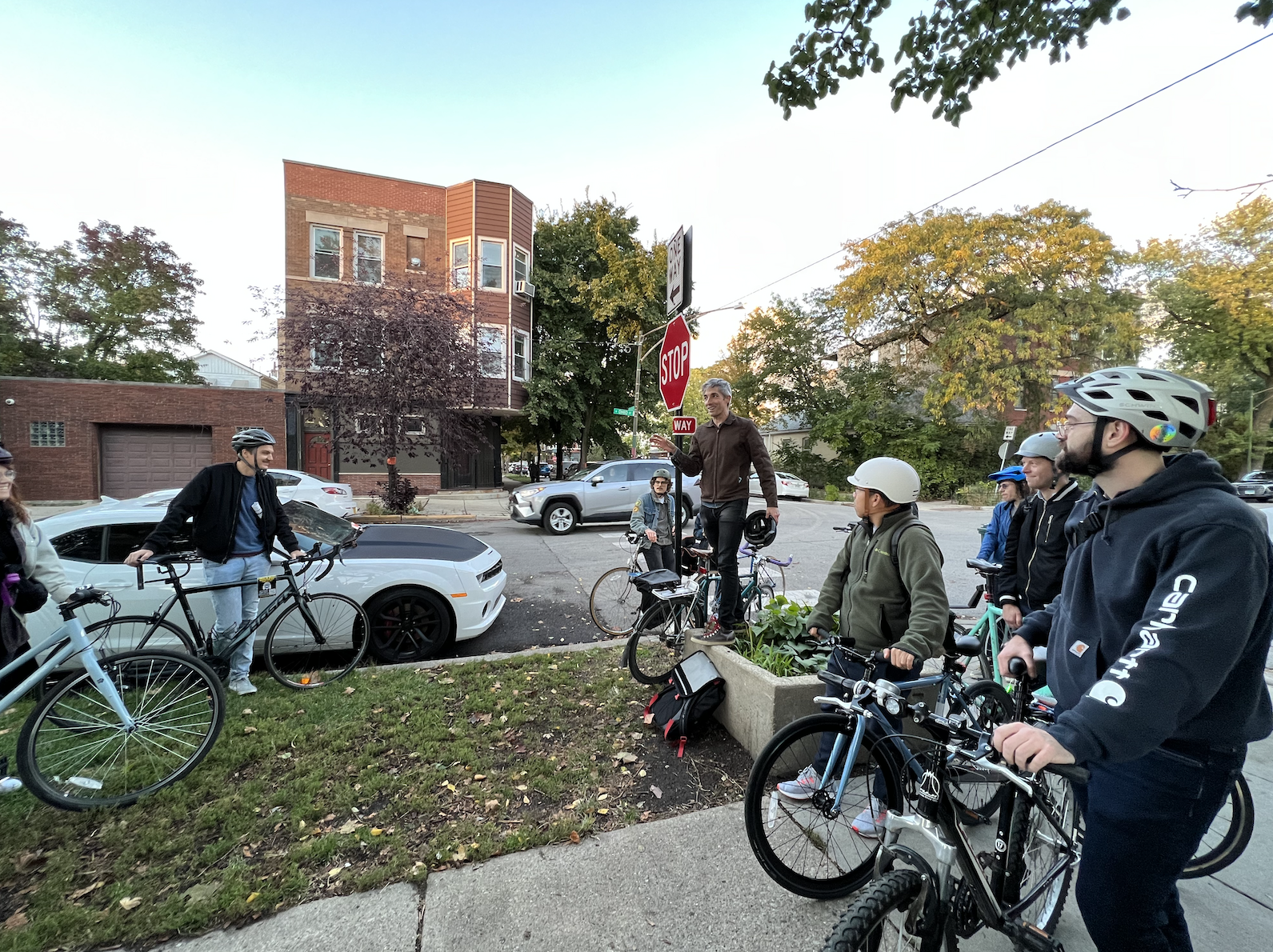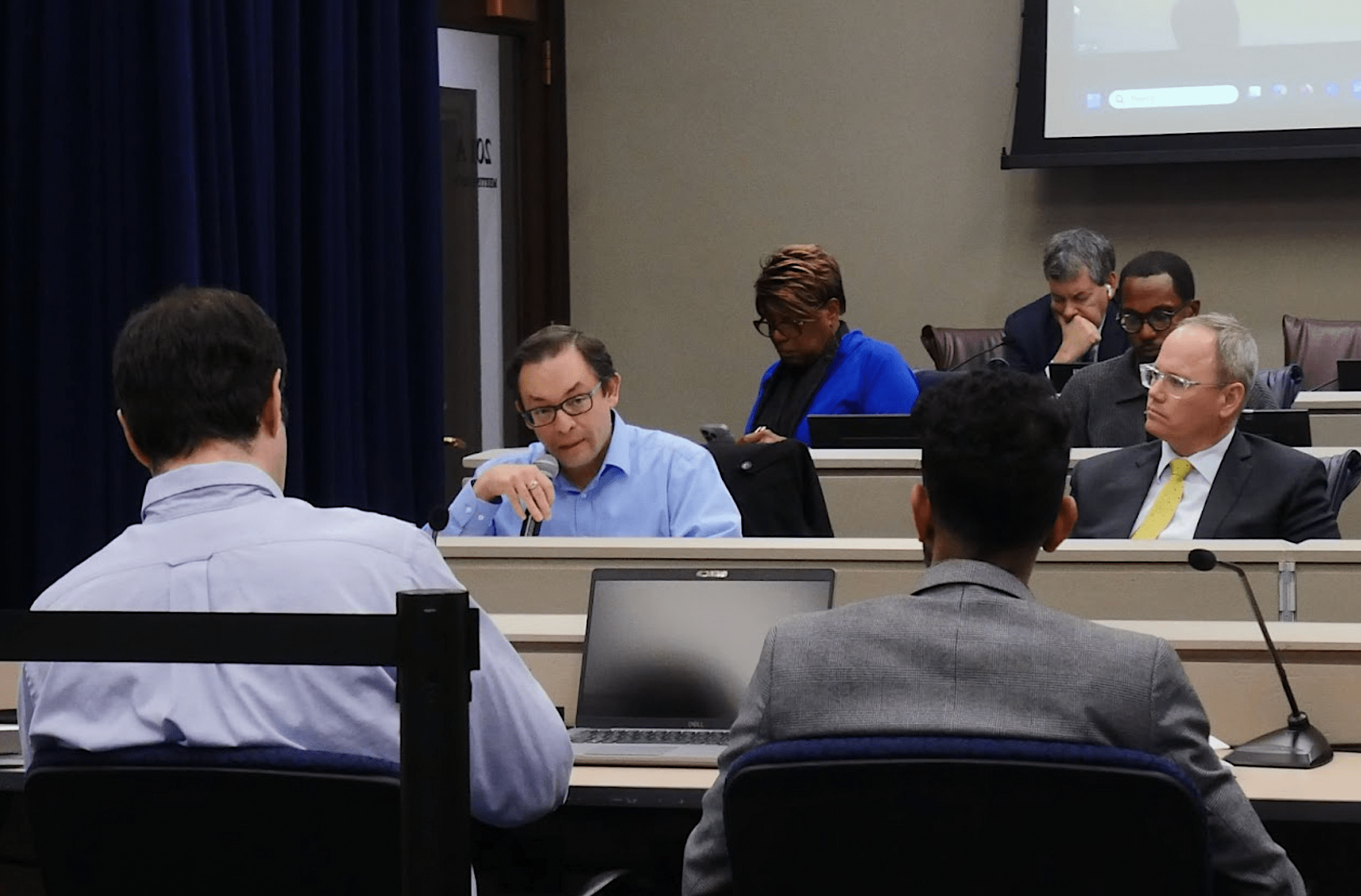Kyle Lucas is a cofounder of Better Streets Chicago.
Alderperson Daniel La Spata recently hosted a bike tour of the 1st Ward highlighting some of the bike lane projects his office has worked on during his first term. In three years, La Spata has become known as one of the most bike-friendly alders in Chicago, with a record that includes installing protected bike lanes and neighborhood greenways, and sponsoring important safe streets legislation.
About 50 residents gathered for the ride at Bickerdike Square Park, located at Ohio and Bishop streets in West Town. La Spata greeted folks and discussed some reasons why safe bike infrastructure is important to him, including the fact that he recently became a father and is thinking about how he’ll soon be riding through the city with his child. After a quick safety brief and details on the route, we were on our way.
It didn’t take long for things to get interesting. We had headed a block north to Erie Street and starting pedaled east, when the person I was chatting with pointed out chalk messages written in the street that read, “F--- OFF LA SPATA.” It was at that same moment I noticed a group of people gathered on the sidewalk, and a man carrying a red solo cup started running past us while screaming unintelligible things, before ultimately throwing cider at the alderman. (He missed.)
When we stopped at the light at Erie and Ashland Avenue, riders expressed surprise and confusion. But La Spata remained calm and continued to lead the ride to our first destination at Erie and Wood streets. It was there he finally addressed what had happened, explaining that he recognized his predecessor, ex-alder Proco "Joe" Moreno, whom La Spata defeated in 2019, in the group on the sidewalk.
In June 2020, after falsely reporting a car as stolen to police, Moreno pled guilty to obstructing justice and disorderly conduct. He later pled guilty to drunk driving after striking eight parked cars in the Gold Coast. The former alderperson, who said he has undergone treatment, has announced his intention to run against La Spata again in the upcoming ward election.
“These are the kinds of people we’re up against,” La Spata said. Former state rep candidate Bob Zwolinski later took to Twitter to claim responsibility for throwing the drink, stating that he "acted alone," implying Moreno wasn't to blame.
La Spata then discussed two projects that will ultimately intersect at Erie/Wood, the first being the dashed "advisory" bike lanes on Erie that were striped this year between Damen Avenue and Noble. This treatment narrows a two-way street with wide dashed dashed lanes on either side, with the intention of calming traffic by forcing drivers to slow down and move to the right, yielding to bike riders, in order to pass oncoming motorists. This approach is more common in European countries like the Netherlands, but it has been met with some pushback in the U.S. La Spata claimed that drivers have quickly learned how to navigate this installation, and that the new layout works because it’s such a low-traffic street.
The other project he discussed is a bi-directional protected bike lane that will be coming to Wood Street after it was approved by residents in a participatory budgeting election in January. This was challenged by some NIMBY neighbors who claimed they weren’t included in the decision, but the alder has stood firm, citing the PB process as residents’ opportunity to make their voices heard.
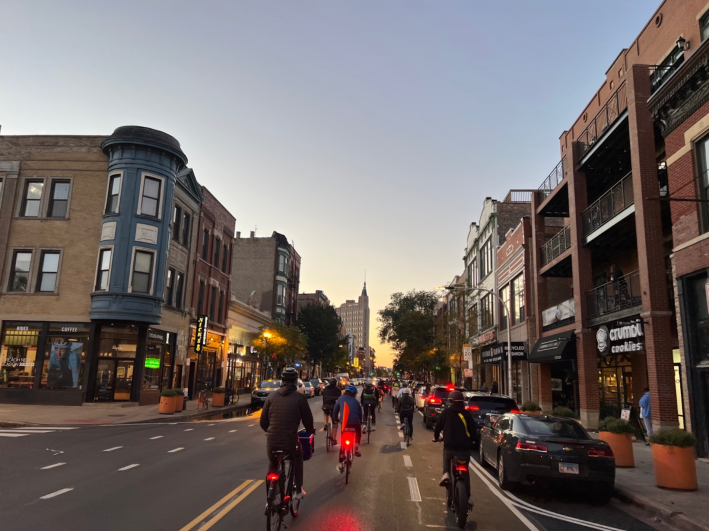
The group then headed north on Wood to Milwaukee Avenue, Chicago's busiest biking street. This stretch of the ride was a mixed bag, with the dashed lanes on Milwaukee leading to Damen (installed when Moreno was in office) being much more stressful to ride in than the ones on Erie due to heavier traffic. As we headed north past Damen crossing into the 2nd and 32nd Wards, the bike lanes change from dashed lanes to non-protected lanes with a solid stripe. When we crossed Western Avenue back into the 1st Ward, the bike lanes changed once again to the bikeways that are delineated by plastic curbs and bollards, installed last year. This was a first-of-its-kind treatment for Chicago and the bikeway has taken a beating from drivers hitting the posts. But has also been a marked improvement over the previous paint-only lanes. These will be upgraded to concrete as part of the Chicago Department of Transportation’s protected bike lane upgrades announced this summer.
The constantly changing bike treatments on Milwaukee are very illustrative of how Chicago’s piecemeal ward-by-ward approach to infrastructure creates inconsistent experiences for residents, even along a short stretch of a single street. While one alderperson might be proactive and push for safe infrastructure, others might not care – or might be opposed – often leaving Chicagoans in precarious situations when crossing district lines.
The ride then took a turn north on Rockwell Street to visit the recently completed Neighborhood Greenway between Milwaukee and Logan Blvd. This treatment added a contraflow ("wrong-way") bike lane heading north on the one-way southbound street, as well as new paint-and-post pedestrian bump-outs at intersections. While Neighborhood Greenways, traffic-calmed side street bike routes, usually don't include physical protection to separate bike riders from drivers, they are often much less stressful to ride than main street bikeways.
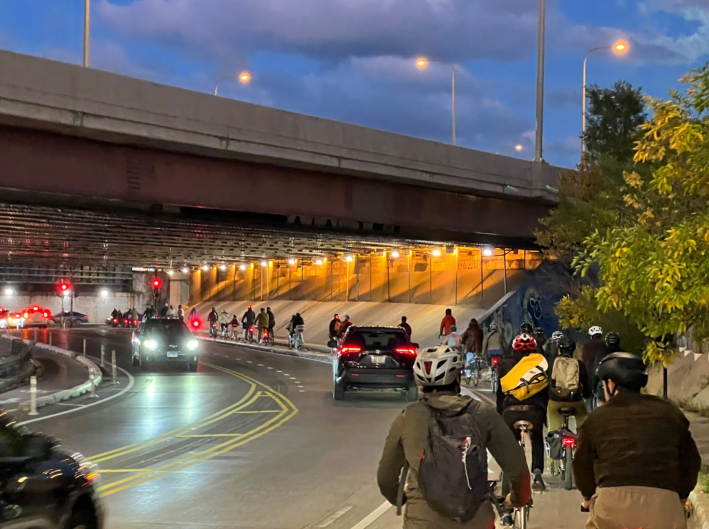
We then headed east on of the Logan Boulevard service drives before connecting with the protected bike lanes CDOT installed after the tragic bike crash death of "School of Rock" drummer Kevin Clark last year. These were recently upgraded from plastic post delineation to precast concrete curb protection. La Spata gathered everyone at the intersection of Logan and Western and took a moment to remember Kevin, as well as videographer Tyler Fabeck, who was also killed on a bike at the intersection in 2009.
La Spata discussed how his office had already recognized how inherently dangerous this dark, complex intersection was before Clark was killed, and had requested upgrades from the city. But unfortunately it took a second bike death at this location to spur transportation officials to take action. He lamented the fact that decision-makers often wait until a tragedy happens before they do anything to make streets safer. La Spata acknowledged what a deadly year it’s been for pedestrians and bike riders, calling for urgent action to prevent further heartbreak.
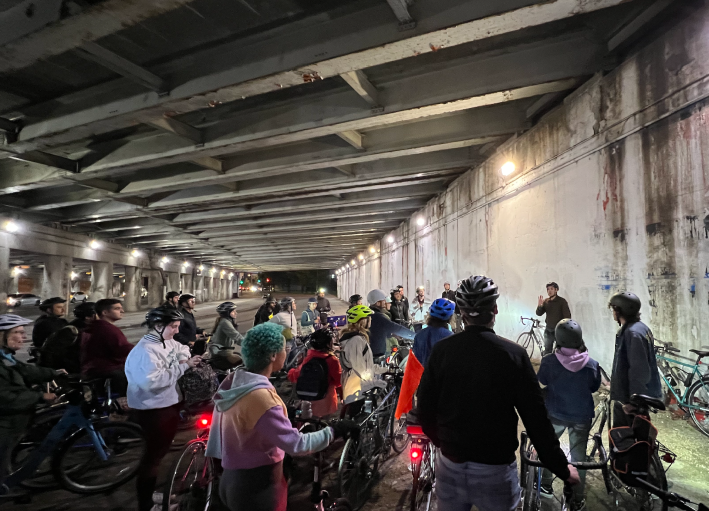
Afterwards, the group headed to Pilot Project Brewing, where participants had a chance to converse with La Spata. Overall, the tour was informative and was a great way to see what changes have been made recently. In a year that’s been filled with tragedy, with eight bike riders killed in Chicago so far, including two children, it was encouraging to see projects that are moving us in the right direction towards safer streets. But it was also a reminder of how dependent we still are on individual alders to enact change. And the ride brought to mind the way aldermanic privilege (the ability of City Council members to veto projects in their wards), plus a lack of leadership on the part of Mayor Lori Lightfoot, are barriers to the creation of the safe, citywide bikeway network that Chicagoans deserve.
